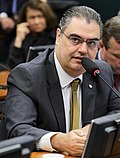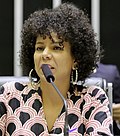| Party | Candidate | Most recent political office
or occupation | Party | Running mate | Most recent political office
or occupation | Coalition | Electoral number |
|---|
| Republicans | 
Lafayette de Andrada | State Deputy from Minas Gerais
(since 2019) | | Republicans | 
Marlei Rodrigues | No prior political office | n/a | 10 |
|  Workers' Party (PT) | 
Nilmário Miranda | Secretary of Human Rights
(2003–2005) | |  Workers' Party (PT) | 
Luana de Souza | No prior political office | n/a | 13 |
|  United Socialist Workers' Party (PSTU) | 
Wanderson Rocha | No prior political office | |  United Socialist Workers' Party (PSTU) | 
Firminia Rodrigues | No prior political office | n/a | 16 |
| [[File:Logomarca_Partido_Cidadania.png|class=skin-invert|100x100px|Cidadania]] Cidadania | 
João Vítor Xavier | State Deputy from Minas Gerais
(since 2011) | | Democrats (DEM) | 
Leonardo Bortoletto | No prior political office | True BH
Cidadania, DEM, PSB, PL, PMN, PSL, PODE, PSC, PTB | 23 |
| Brazilian Labour Renewal Party (PRTB) | 
Bruno Engler | State Deputy of Minas Gerais
(since 2019) | | Brazilian Labour Renewal Party (PRTB) | 
Mauro Quintão [a] | No prior political office | n/a | 28 |
|  Workers' Cause Party (PCO) | 
Marilia Domingues | No prior political office | |  Workers' Cause Party (PCO) | 
Silvanio Vilaça | No prior political office | n/a | 29 |
|  New Party (NOVO) | 
Rodrigo Paiva | No prior political office | |  New Party (NOVO) | 
Patrícia Albergaria | No prior political office | n/a | 30 |
| Brazilian Woman's Party (PMB) | 
Edmar Xavier | No prior political office | | Brazilian Woman's Party (PMB) | 
Paula Maia | No prior political office | n/a | 35 |
| Brazilian Social Democracy Party (PSDB) | 
Luisa Barreto | No prior political office | | Brazilian Social Democracy Party (PSDB) | 
Juvenal Araújo | Acting Minister of Human Rights
(2018) | n/a | 45 |
|  Socialism and Liberty Party (PSOL) | 
Áurea Carolina | Federal Deputy from Minas Gerais
(since 2019) | | Popular Unity (UP) | 
Leonardo Péricles | No prior political office | Left-wing Front BH in Movement
PSOL, UP, PCB | 50 |
| Patriota | 
Marcelo Souza e Silva | No prior political office | | Patriota | 
Leandro Moreira | No prior political office | n/a | 51 |
|  Social Democratic Party (PSD) | 
Alexandre Kalil | Mayor of Belo Horizonte
(2017–2022) | |  Social Democratic Party (PSD) | 
Fuad Noman | Secretary of Finances
(2017–2020) | Courage and Labour
PSD, MDB, PV, REDE, Avante, PDT, DC, PP | 55 |
|  Communist Party of Brazil (PCdoB) | 
Wadson Ribeiro | Federal Deputy from Minas Gerais
(2011–2019) | |  Communist Party of Brazil (PCdoB) | 
Kátia Vergilio | No prior political office | n/a | 65 |
| Solidariedade | 
Wendel de Mesquita | State Deputy of Minas Gerais
(since 2019) | | Solidariedade | 
Sandra Bini | No prior political office | n/a | 77 |
|  Republican Party of the Social Order (PROS) | 
Fabiano Cazeca | No prior political office | | Christian Labour Party (PTC) | 
Paula Gomes | No prior political office | The Competence BH Needs
PROS, PTC | 90 |


































